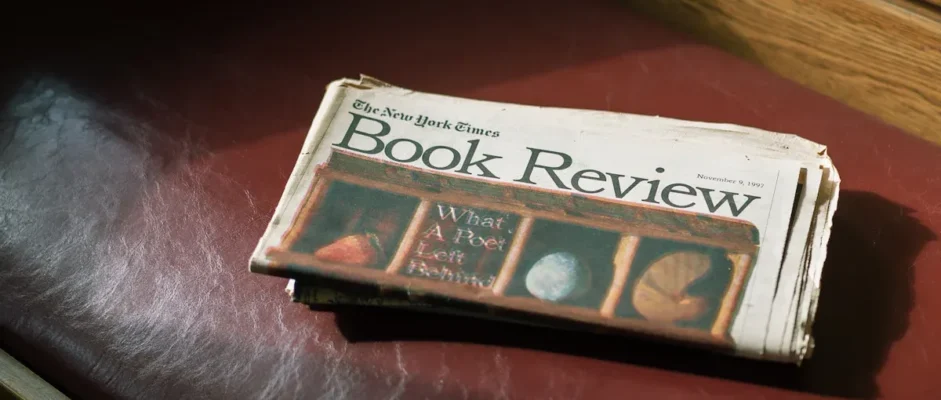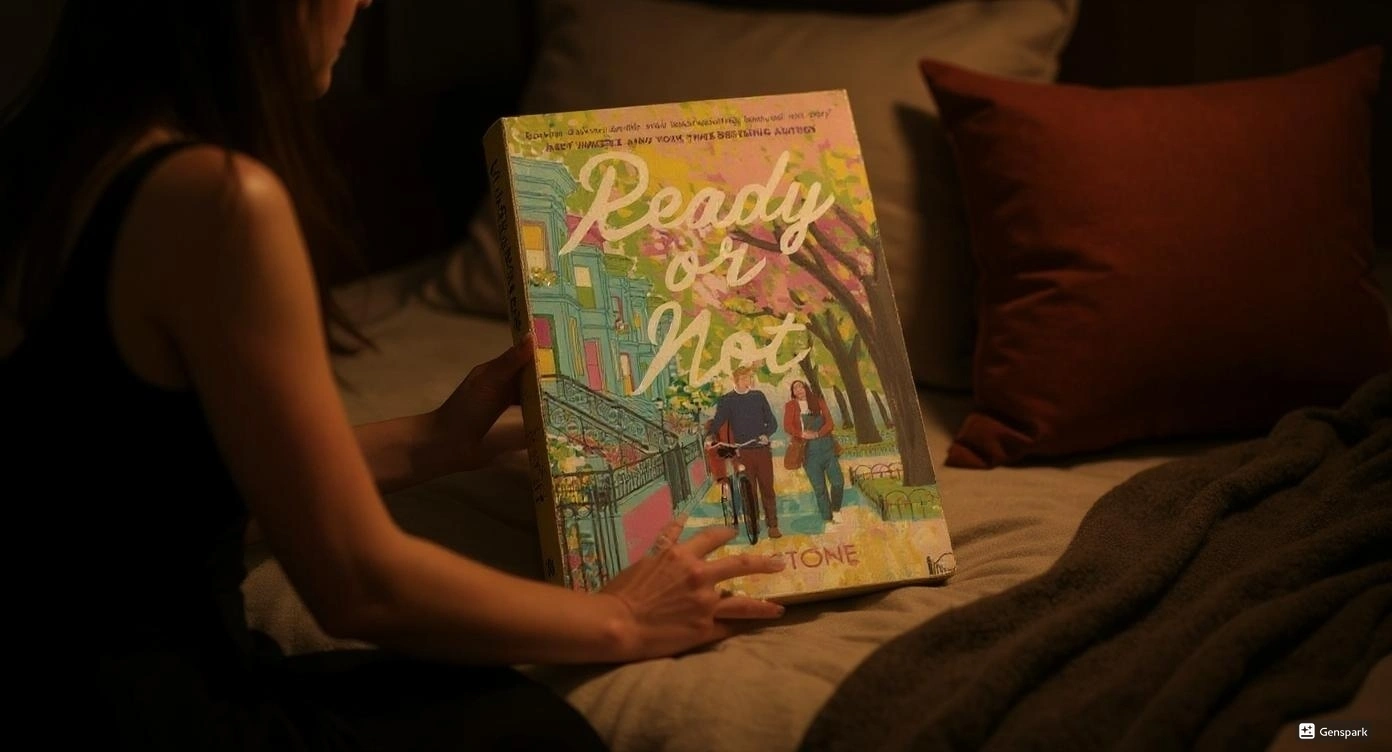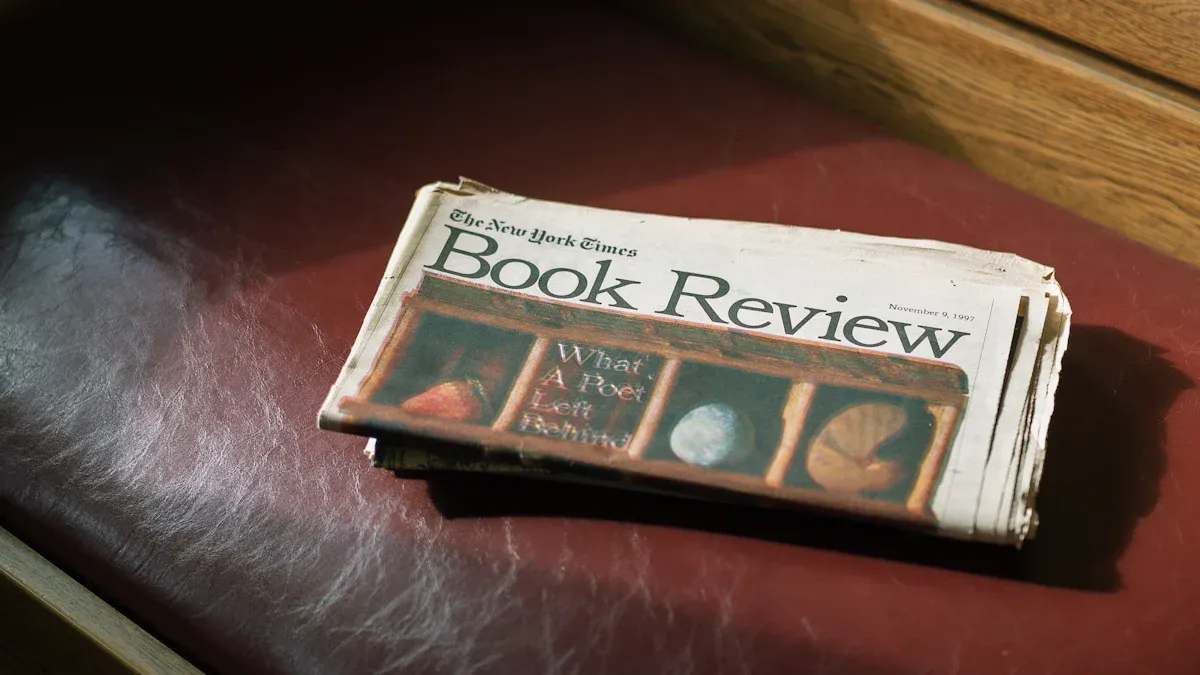I’ll be honest—I sometimes lose sleep over books that get under my skin. Flashlight by Susan Choi did just that. This novel doesn’t just tug at your emotions; it lingers, reshaping your mood in subtle but lasting ways.
Studies even show that literary fiction like this offers a more positive emotional profile than most reads, which I totally felt.
Why pick it up?
The writing is sharp.
The emotional impact is real and measured.
If you crave stories that leave you thinking, this one’s worth your time.
Key Takeaways
Flashlight tells a strong story about family, identity, and loss. The feelings in the book stay with you after you finish.
The story takes place in Japan in 1978. This setting gives the book culture and history. These things help shape the people and the story.
Louisa tries to find her missing father. She feels grief, wants to belong, and learns about herself. Susan Choi writes in a special way.
She changes points of view and uses a timeline that is not in order. This keeps readers interested and guessing.
The book leaves some questions without answers. It has strong feelings and tension. Readers who pay close attention will get more from it. Flashlight is good for people who like literary fiction.
It has strong characters, deep ideas, and a setting you can picture. The story mixes mystery, family drama, and history. This makes it great for book clubs and talks.
Sometimes the story moves slowly. Sometimes the plot is hard to follow. But the honest feelings and clear details make it a book you will remember.
Verdict
I’ll be honest—sometimes I get so wrapped up in a book that I forget to eat, sleep, or even check my phone. Flashlight by Susan Choi did that to me. I found myself reading late into the night, chasing answers and feeling every twist in Louisa’s journey.
This isn’t just another family drama or historical novel. It’s a story that digs deep into what it means to belong, to lose, and to search for yourself when the world feels upside down.
I recommend Flashlight by Susan Choi, but with a few caveats. If you want a book that hands you all the answers, this one might frustrate you. The story explores identity, culture, and the way big, uncontrollable events—like war and politics—shape our lives.
Family secrets, shifting loyalties, and the ache of not quite fitting in all play a part. These themes don’t just sit on the surface; they pull you in, making you question your own sense of self and place in the world. That’s what made the emotional resonance so strong for me. I have to give props to Choi for weaving such a layered, thoughtful narrative.
If I had to put a number on it, I’d say this book lands at a solid 7/10. It’s not perfect, but it’s ambitious, moving, and lingers long after you turn the last page.
Who Will Enjoy It
Not every book is for every reader, and that’s okay. Here’s who I think will get the most out of this one:
Readers who want a long, immersive story with deep family dynamics and psychological insight.
Anyone who loves ambitious, multi-layered novels that mix family drama with geopolitical intrigue.
Fans of literary fiction who appreciate stylistic excellence and a nuanced look at identity and culture.
People who enjoy novels that challenge and reward both intellectually and emotionally.
Book club members looking for rich discussion topics—this one has plenty, from family secrets to global politics.
Readers who want characters that feel real, flawed, and unforgettable.
What Makes It Unique
What sets this novel apart? For me, it’s the way Choi tells the story. She uses a third-person limited perspective, mostly through Louisa’s eyes. Words like “seemed,” “believe,” “thought,” and “wanted” pop up often, showing us Louisa’s bias and uncertainty without spelling everything out. This style keeps you guessing—what’s real, what’s imagined, and what’s just Louisa’s hope or fear?
The tone is quietly eerie, almost chilling at times. I found myself questioning what was true and what was just a trick of memory or emotion. It reminded me a bit of the film Joker, where you’re never quite sure if you can trust what you see. That sense of uncertainty made the story even more gripping.
Note: If you crave a straightforward plot, this might not be your cup of tea. But if you love stories that play with perspective and keep you on your toes, you’ll find a lot to admire here.
Plot

Main Characters
Louisa
Louisa stands at the heart of this story. She’s a teenager, but she feels older than her years. I saw her as both tough and fragile. She’s caught between two worlds—her American roots and her life in Japan. Louisa’s voice pulled me in right away.
She’s curious, stubborn, and sometimes lost. I related to her need for answers and her struggle to fit in. Her journey felt real, especially when she faced moments of doubt or hope. I found myself rooting for her, even when she made mistakes.
Serk
Serk, Louisa’s father, is a complex figure. He’s a journalist, always chasing the next big story. He loves Louisa, but he’s not always present. I sensed a lot of tension between his work and his family. Serk tries to protect Louisa, but he also keeps secrets.
His disappearance becomes the turning point of the novel. I kept wondering what drove him and what he was hiding. Serk’s choices shape Louisa’s path and add layers to the family drama.
Setting
The story takes place in Japan in 1978. The setting feels vivid and alive. I could almost hear the city sounds and see the neon lights. The cultural mix is strong—Louisa and Serk are outsiders, trying to find their place. The political climate adds tension.
There’s a sense of unease, like something big is always about to happen. I loved how the setting shaped the characters’ actions and feelings. It’s not just a backdrop; it’s a force in the story.
Disappearance
Serk’s sudden disappearance changes everything. One day, he’s there. The next, he’s gone. Louisa is left alone, confused, and desperate for answers. This event turns the book into a coming-of-age mystery. I felt her fear and frustration.
The search for Serk pushes Louisa to grow up fast. She faces secrets, lies, and the harsh reality of being on her own. The disappearance also brings out the family drama and the cross-cultural struggles. I found myself turning pages late at night, needing to know what happened.
Themes
Family
Books about family always make me think. I remember my own family when I read stories like this. In Flashlight by Susan Choi, family is very important. It is not just in the background. Family is what makes the story move forward. Louisa and her father, Serk, have a strong bond. Their relationship feels real and honest. They love each other, but there are secrets and tension too. I saw moments that felt like real family dinners. Sometimes there are awkward silences. Sometimes you want to talk, but you just can’t.
The book also looks at gender roles and family expectations. Louisa’s story made me think about how families shape us, especially girls. I have read about how people want families to be fair. Feminist thinkers say families should be more equal and caring. They believe care work, like cooking and listening, is important. It matters as much as jobs outside the home.
Here are some ideas and studies that help explain why family stories feel real:
Evidence Type | Description |
|---|---|
Theoretical Frameworks | Feminist theories from Science, Technology, and Society (STS) and ethics focusing on care work and care ethics (e.g., Annemarie Mol, María Puig de la Bellacasa, Joan Tronto). Use of sensitizing concepts from sociological and HCI/CSCW literature such as DeVault’s concept of feeding and Charmaz’s sensitizing concepts to analyze gendered labor, domestic work, and family tensions. |
Case Studies | Qualitative data from 18 family interviews and design sessions centered on family meal practices. Data was analyzed using interpretive and iterative coding methods to identify themes around family dynamics, conflicts, and tensions. The study situates itself in everyday family meal contexts to reveal honest perspectives on family interactions and tensions, supporting a holistic and critical examination of family dynamics in domestic HCI design. |
The way we talk about family has changed a lot. For almost 200 years, people have argued about what makes a family fair. Women wanted more than just the right to vote. They wanted families where everyone’s voice counts. These ideas show up in Louisa’s story. She tries to push back against what others expect from her.
Grief
Grief in this book felt very real to me. When Serk disappears, Louisa’s world changes. I could feel her sadness. The story does not rush through her pain. It lets grief stay for a while. Grief changes everything. I have lost people too. I know grief can surprise you at strange times. It might be a song, a smell, or an empty chair.
Louisa’s grief is not just about missing her dad. She also loses her feeling of safety. She tries to remember happy times, but memories fade. The book shows how grief can make you feel alone. Even if you are with other people, you can feel lonely. I wanted Louisa to find hope again.
What stood out to me:
Grief is slow and can surprise you.
It changes how you see yourself and others.
Healing takes time, and that is okay.
Identity
Identity is a big theme in this book. Louisa lives between two cultures, American and Japanese. She never feels like she fits in. I remember feeling out of place when I moved as a kid. It is hard when you do not know where you belong.
The book shows that identity is not just about where you are from. It is about the stories you tell yourself. It is about secrets and choices. Louisa’s search for her father is also a search for herself. She learns that identity can be confusing, and that is normal.
Why this matters:
Identity comes from family, culture, and what you go through.
Feeling different can be lonely, but it can also be strong.
Finding yourself is a journey that takes time.
History
History in this novel isn’t just a backdrop—it’s a living, breathing force that shapes every page. I felt it in the smallest details, from the food Louisa eats to the way people look at her on the street. The story takes place in 1978 Japan, a time and place I didn’t know much about before picking up this book.
I found myself Googling old photos and news headlines, just to get a better sense of what Louisa was experiencing. That’s when I realized: history in Flashlight by Susan Choi isn’t just about dates and events. It’s about how the past seeps into our lives, even when we don’t notice it.
I have to admit, I’m a sucker for books that make me feel like I’m time traveling. This one did that in a subtle, almost chilling way. The political tension in Japan during the late 1970s isn’t front and center, but it’s always there—like a low hum you can’t quite tune out. Louisa and her father, Serk, are outsiders, and I could feel their unease. The uncertainty of the era made every choice feel riskier, every secret heavier.
Tip: If you love stories where history feels personal, not just something you read in a textbook, this novel delivers.
What really struck me was how the characters carry the weight of history on their shoulders. Louisa’s family history, her father’s work as a journalist, and the larger political climate all mix together. Sometimes, I felt like Louisa was searching for her own story in the middle of everyone else’s. That’s a feeling I know well—trying to figure out where you fit when the world keeps changing around you.
Here’s what stood out to me about the theme of history in this book:
History shapes identity: Louisa’s sense of self changes as she learns more about her family and the world around her.
The past isn’t finished: Old secrets and past events keep coming back, forcing the characters to face things they’d rather forget.
Personal and political collide: The big events of the world affect even the smallest moments in Louisa’s life.
I found myself thinking about my own family’s stories—what gets remembered, what gets left out, and how those choices shape who we become. This book reminded me that history isn’t just something that happens to other people. It’s something we live, every day, even if we don’t always realize it.
Style
Prose
I have to admit, the prose in this novel surprised me. I expected something straightforward, but what I got felt both sharp and delicate. The writing style walks a tightrope between cool detachment and bursts of raw emotion. Sometimes, I found myself pausing just to reread a line that hit a little too close to home.
The sentences can feel “glassy”—clear, but with a surface tension that hints at something deeper underneath. I noticed the author uses exclamation points in ways that made the emotions jump off the page. It’s not just for show; it actually made Louisa’s feelings feel more real and urgent.
What really stood out to me:
Economy of style: Every word counts. There’s no fluff.
Emotional volatility: The prose swings from icy calm to sudden heat, which kept me on my toes.
Lyrical moments: Sometimes, the descriptions felt almost poetic, but never overdone.
Critics often talk about how some writers can balance a “hot-but-cold” tone, and I saw that here. The writing felt both loving and a little bitter, especially in scenes between Louisa and her father. I love when a book’s style matches its emotional core.
Structure
The structure of the novel kept me guessing. The story doesn’t move in a straight line. Instead, it jumps between memories, present moments, and Louisa’s inner thoughts. At first, I felt a bit lost, but soon I realized this style fits the story’s themes. Life rarely follows a neat timeline, especially when you’re dealing with loss and confusion.
Here’s what I noticed:
Nonlinear timeline: The story weaves back and forth, echoing how memory works.
Short, punchy chapters: These made it easy to keep reading, even when I promised myself I’d stop after just one more.
Shifting focus: Sometimes, the spotlight moves from Louisa to other characters, giving the story more depth.
This structure made the book feel more like a puzzle. I had to piece together clues, which made the reading experience more engaging.
Perspective
The perspective in this novel fascinated me. Most of the story unfolds through Louisa’s eyes, but the narration sometimes pulls back, letting me see things she can’t. This mix of close and distant viewpoints made me question what was true and what was just Louisa’s interpretation. I found myself wondering, “Would I see things the same way if I stood in her shoes?”
Research shows that shifting perspectives in stories helps readers think more deeply about characters’ choices. I noticed how the book encouraged me to step into Louisa’s mind, then step back and judge the situation from afar. This back-and-forth made the story feel richer and more real. It also reminded me that everyone’s version of the truth looks a little different.
Emotional Impact

Resonance
I have to admit, some books just hit different. This one did more than just keep me turning pages—it made my heart race and my mind wander long after I finished. I noticed my own reactions while reading. My pulse actually sped up during certain scenes. I even caught myself holding my breath, waiting to see what Louisa would do next.
That’s not just me being dramatic. Studies show that stories like this can cause real changes in our bodies. Researchers measured heart rates and found that emotional moments in stories can make your heart beat faster. It’s wild, but it makes sense. When I read about Louisa’s search for her dad, I felt that same rush.
Here’s what I think makes the emotional resonance so strong:
Real connections: The book made me feel like I was right there with Louisa, sharing her worries and hopes.
Lasting feelings: Even after I put the book down, I kept thinking about the characters and their choices.
Shared experience: Interviews with readers show that many people feel a deep connection to stories that explore family and loss. They talk about feeling seen and understood.
Uncertainty
Uncertainty runs through every page of this novel. I felt it in the way Louisa questioned everything—her memories, her father’s actions, even her own identity. The author doesn’t give easy answers. Instead, I found myself guessing and second-guessing what was real. Sometimes, I wanted to shout at the book, “Just tell me the truth!” But that’s what made it so gripping.
This sense of not knowing kept me on edge. I never felt comfortable or sure of what would happen next. The story’s structure, with its jumps in time and shifting perspectives, added to that feeling. I started to realize that uncertainty isn’t just a plot device. It’s part of Louisa’s world, and it became part of mine as I read.
Keeps you guessing: I couldn’t predict the ending, and that made every chapter feel important.
Reflects real life: Life doesn’t always give us clear answers, and this book captures that perfectly.
Emotional tension: The uncertainty made the emotional moments hit even harder. I felt Louisa’s confusion and fear as if they were my own.
Reception
Critical Acclaim
I have to admit, I notice when a book gets a lot of talk. When I first heard about Flashlight by Susan Choi, I saw that many critics had something to say. Some people called it “chilling” and liked how deep the feelings were. Others thought the story was too unclear and wanted more answers. I understand both opinions. This novel does not give you easy answers. That can be fun or annoying, depending on what you like.
What really caught my eye was how many reviewers talked about the book’s unique narrative style. Choi mixes memory, uncertainty, and history in a way that stands out. I saw words like “haunting,” “layered,” and “thought-provoking” in many reviews. I think Choi did a great job making a story that stays with you. Even days after I finished, I kept thinking about Louisa and her search for truth.
Most critics seemed to agree on these points:
Emotional resonance: The book makes you feel a lot, especially if you have ever felt lost or different.
Complex characters: Louisa and Serk seem real, with good and bad sides.
Atmospheric setting: 1978 Japan feels real in every part of the story.
Comparison to Trust Exercise
If you have read Susan Choi’s Trust Exercise, you might wonder how this new book compares. I remember Trust Exercise as a book that played with truth and made me think hard. Flashlight by Susan Choi is a little like that, but also very different.
Both books use unreliable narration and make you wonder what is real. I kept guessing about every memory and reason. But Trust Exercise is about high school drama and acting. Flashlight is about family, history, and identity. The story feels more personal here. Louisa’s journey made me cry sometimes, especially when she was alone and unsure.
Here is a quick look:
Feature | Trust Exercise | Flashlight by Susan Choi |
|---|---|---|
Setting | 1980s American high school | 1978 Japan |
Main Theme | Truth, performance | Family, identity, history |
Narrative Style | Fragmented, meta | Nonlinear, memory-driven |
Emotional Impact | Disorienting, sharp | Lingering, haunting |
Strengths
Highlights
I have to admit, some books just stick with me. This one did. When I think about what made it special, a few things jump out right away.
Emotional honesty: The feelings in this story felt raw and real. Louisa’s confusion, hope, and pain all hit me hard. I found myself thinking about her long after I finished the last page.
Atmospheric setting: Japan in 1978 came alive for me. The details—like the city sounds, the food, and the way people moved through crowded streets—made me feel like I was right there with Louisa.
Complex characters: No one in this book felt flat. Louisa and Serk both made mistakes, but that made them feel more human. I rooted for them, even when I didn’t agree with their choices.
Unique narrative style: The way the story jumps between memories and present moments kept me on my toes. I liked piecing together the puzzle, even when it made my brain hurt a little.
Themes that matter: Family, grief, and identity are big topics. This book didn’t shy away from tough questions. It made me think about my own life and the stories I tell myself.
Weaknesses
No book is perfect, and this one has its rough spots. I want to be fair, so here’s what didn’t work as well for me:
Pacing can drag: Some chapters felt slow. I found myself wishing the story would move faster, especially in the middle.
Unanswered questions: The mystery around Serk’s disappearance kept me hooked, but I wanted more closure. I finished the book still wondering about some big things.
Nonlinear structure: The jumps in time and perspective sometimes left me confused. I had to flip back a few pages to figure out where I was in the story.
Not for everyone: If you like clear answers and tidy endings, this book might frustrate you. The uncertainty is part of the experience, but it’s not always easy to love.
Audience
Who Should Read
I’ll be honest, I sometimes pick up a book just because I want to feel something real. If you’re like me—someone who wants a story that lingers and makes you question your own memories—this book might be your next obsession. I found myself reading late at night, flashlight in hand (yes, the irony isn’t lost on me), just to see what would happen to Louisa.
This book is for you if:
You love literary fiction that digs deep into family, identity, and history.
You enjoy stories with emotional honesty and characters who feel flawed but real.
You don’t mind a little mystery and uncertainty—sometimes you even crave it.
You want a book that sparks big discussions in your book club or with friends.
You appreciate a setting that feels alive and shapes the story.
Reader Expectations
Before you dive in, let me set some expectations. I went in thinking I’d get a straightforward mystery, but what I got was so much more—and sometimes, a little less. The plot moves in waves, not straight lines. Some chapters felt chilling and pulse-pounding, while others made me pause and reread, just to catch the emotional undercurrent.
Here’s what you can expect:
A nonlinear story: The timeline jumps, and you’ll need to piece things together.
Open questions: Not every mystery gets solved. Some answers stay just out of reach.
Emotional depth: The grief and confusion Louisa feels might leave you gasping or even a little teary.
Rich atmosphere: 1978 Japan isn’t just a backdrop—it’s a character in itself.
A slower pace: This isn’t a book to rush. It rewards patience and close reading.
Sip The Unknown—Discover Stories You Never Knew You’d Love!
Dionysus Reviews Has A Book For Every Mood
Biography & Memoir
Fiction
Mystery & Detective
Nonfiction
Philosophy
Psychology
Romance
Science Fiction & Fantasy
Teens & Young Adult
Thriller & Suspense
Frequently Asked Questions
Is “Flashlight” a fast-paced read?
Not really. The story moves at its own pace. Some chapters felt slow, but I liked how it let me soak in the atmosphere. If you want a quick thriller, this might not be your best pick.
Do I need to know Japanese history to enjoy the book?
Nope! I didn’t know much about 1978 Japan before reading. The book gives enough context. I found myself Googling a few things, but you can enjoy the story without being a history buff.
Will I get all the answers by the end?
Honestly, no. Some mysteries stay open. I finished the last page still wondering about a few things. If you like clear endings, this might leave you a bit unsettled.
Is this book good for book clubs?
Absolutely! I think it’s perfect for discussion. You’ll find plenty to talk about—family secrets, identity, and what’s real versus what’s remembered.
Great for debate
Lots of layers to unpack
How old should readers be?
I’d say teens and up. The themes are deep, but there’s nothing graphic or inappropriate. If you’re okay with some emotional heaviness, you’ll be fine.
What if I don’t like nonlinear stories?
You might struggle a bit. The timeline jumps around, and sometimes I had to reread to keep up. If you like stories that move in a straight line, this could be a challenge.
Does the book have any humor?
Surprisingly, yes! Even with all the tension, I found moments that made me smile. Louisa’s voice has a dry wit. It helped balance the heavier parts.









